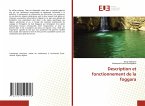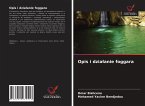In the Saharan environment, water is available, but the vast majority of it is very poorly renewable and also vulnerable to pollution and in particular to the phenomenon of salinization. Water resources in the Saharan regions are most often poorly managed and require rational and integrated management with a view to sustainability. Their exploitation must obey rules specific to the Saharan regions, as in the case of the traditional water catchment and irrigation systems of the South (foggara), which bear witness to remarkable human hydraulic engineering, the organization of which is at the forefront. It should be emphasized that in these regions, water is of paramount importance because it not only erases aridity but also enhances the value of the land and is ultimately considered as a main component of land tenure.
Hinweis: Dieser Artikel kann nur an eine deutsche Lieferadresse ausgeliefert werden.
Hinweis: Dieser Artikel kann nur an eine deutsche Lieferadresse ausgeliefert werden.








